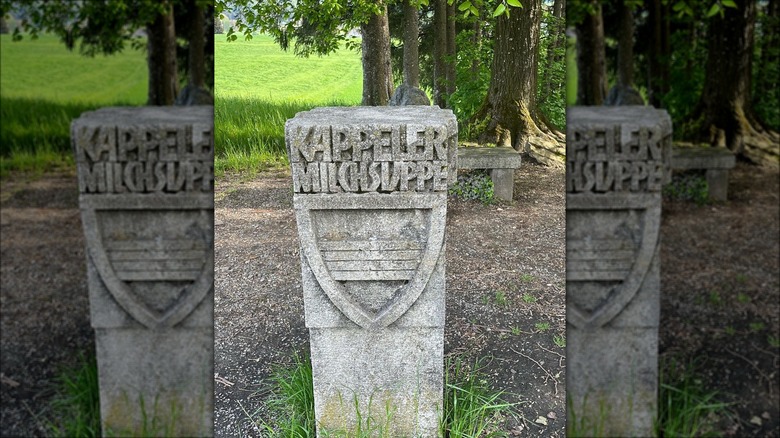Milchsuppe: The Swiss Soup Famous For Halting A 16th-Century War
Truth is stranger than fiction, they say. While this may be true depending on what genre we're talking about (presumably not one where talking unicorns feature prominently), certain historical anecdotes about food do seem as if they could have come straight from the pages of a storybook. Such is the origin of Kappeler milchsuppe, which is a somewhat bland dish with a rather dramatic (alleged) backstory. (There are always caveats, and we will cover those in due time.)
Kappeler milchsuppe, while it may contain aromatics, seasonings, and cheese for flavoring, has but two main ingredients: bread and milk. As legend has it, each ingredient was supplied by one of two opposing sides in a 16th-century Swiss religious war. The Protestant canton of Zurich, it seems, wanted to take over the Catholic canton of Zug, and the Zugians (Zugites? Zugsters?) naturally objected. A war ensured ... or would have, but a last-minute attempt to negotiate a peace treaty led to a delay in hostilities. The bored, hungry troops started mixing and mingling (they were fellow countrymen if not coreligionists) and soon Protestant bread met Catholic milk and soup ensued. Disinclined to fight on full bellies, the combatants put off their clash for another day, but it was postponed indefinitely when that peace treaty was finally signed some two weeks later.
So is the milchsuppe story true?
The milchsuppe moment was memorialized in a monument that stands on a hill above Lake Zug (the site of the battle that did not happen), while a famous painting that hangs in Zurich's Kunsthaus Museum depicts soldiers laying down their arms to take up soup spoons instead. These days, milchsuppe still makes an appearance on tables where bickering Swiss politicians sit down to dine as a reminder that once before, two opposing sides (purportedly) found common ground.
Ahh, but did it actually happen? Some historians claim there's no truth to the story, while others admit that it may have been slightly exaggerated. What's more, the temporary truce didn't last, as the battling Zs (Zurich and Zug) were back at it again just two years later. Still, it's to be noted that short-lived alliances between opposing sides in a war are not unknown: The Christmas Truce of 1914 found German and British soldiers singing Christmas carols and playing soccer in No Man's Land for a day or two, although they, too, resumed their originally scheduled World War One after the holidays were over.
Interestingly enough, the soup story also bears resemblance to a folktale called "Stone Soup" which tells of people combining their resources to make a soup that all can share. The first English-language version, dating to the early 19th century, is set in the Zurich area and was written by a Swiss immigrant who may have been familiar with the milchsuppe incident.

